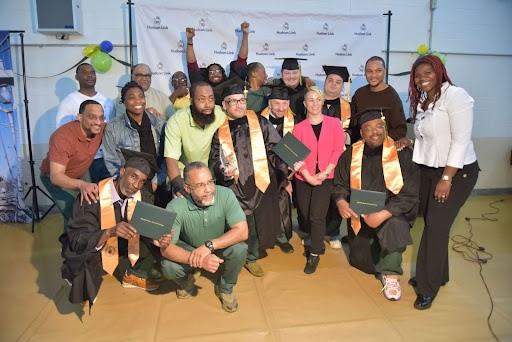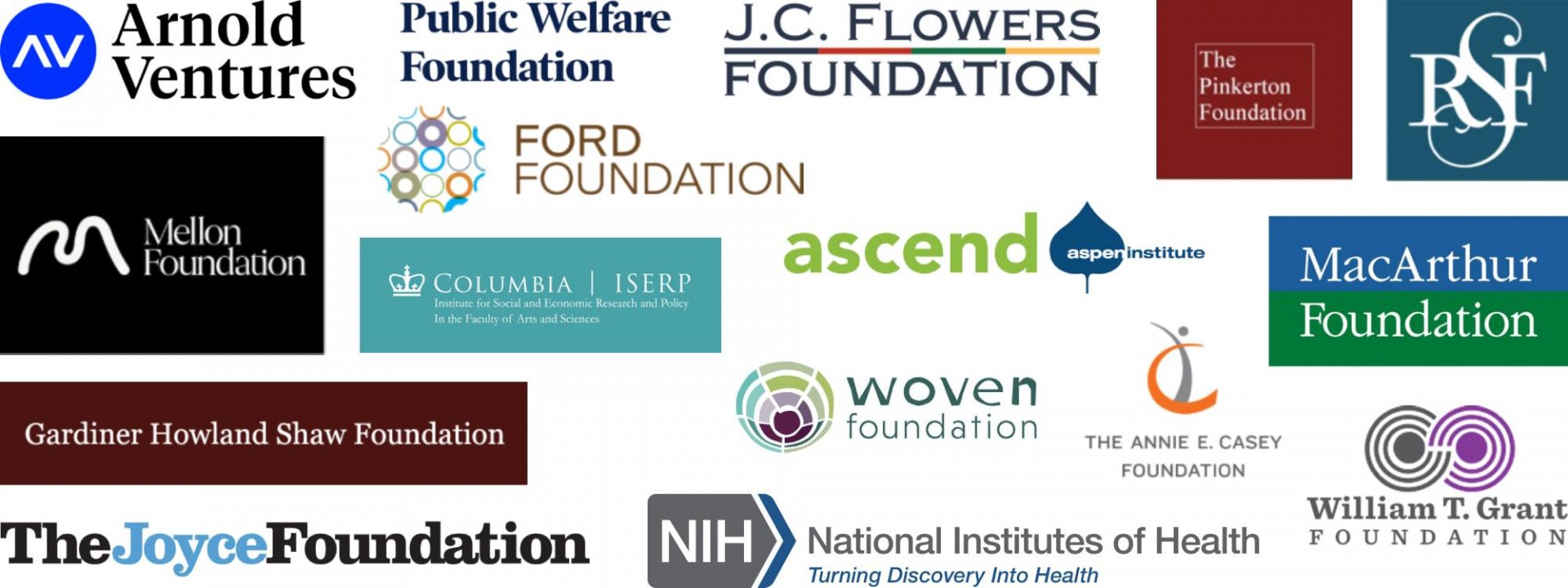Since its launch in 2017, the Justice Lab has conducted cutting-edge research, elevated the voices of those directly impacted by incarceration, and placed the convening power of a great university in the service of communities seeking to reimagine justice. This past year, the Lab has made significant strides in advancing its mission.
A Message From The Justice Lab

Since its launch in 2017, the Justice Lab has conducted cutting-edge research, elevated the voices of those directly impacted by incarceration, and placed the convening power of a great university in the service of communities seeking to reimagine justice even as they contend with racism, poverty, crime, and over-incarceration.
This past year, the Lab has made significant strides in advancing its mission. The Square One Project, our guiding initiative on narrative change, brought together leaders from around the country to reckon with a history of racial injustice and punitive excess. The Emerging Adult Justice Project pioneered reform efforts to support the life course development of young people. The Probation and Parole group continued their urgent work to reduce revocations that needlessly send people back to prison and jail. New research on Rikers Island jail, solitary confinement, and fines and fees has informed initiatives to eliminate mass incarceration and harmful conditions in prisons and jails.
Within the Lab, we convened an inaugural cohort of Summer Fellows, hosted interdisciplinary speakers at the forefront of criminal justice for our first Justice Lab Speaker Series, and welcomed Jeremy Travis, a long-time collaborator who has joined the Lab as a Senior Fellow.
We are grateful to our supporters, partners, and the Justice Lab team for their remarkable work this year to reimagine justice.

Bruce Western
Director, Columbia Justice Lab
From the Projects
Collaborative on Reckoning and Justice
In April of this year, The Square One Project launched the Collaborative on Reckoning and Justice (Collaborative). The Collaborative is a three-year effort to encourage reflection on racial reckoning within the criminal justice system in the United States and inspire values-driven action in response to insights gained in the process. Through the individual and collective work of its members — papers, projects, podcasts, video pieces, communication campaigns, and more — the Collaborative will model the importance of reckoning as a crucial component of sustainable progress towards justice. This will shift narrative and cultural understanding, and will generate much needed new ideas for foundational change: new policy solutions at the local, state, and national levels, new collaboration opportunities, and new research.
View the Collaborative membership. Watch a short video about the Collaborative.
Oklahoma Roundtable on Values and Justice
This year, The Square One Project worked with local Oklahoma partners at The Education and Employment Ministry (TEEM) and Oklahomans for Criminal Justice Reform to host two public convenings of the Roundtable on Values and Justice in Oklahoma, bringing together advocates, scholars, artists, community members, and justice-impacted people across the state to reimagine the criminal legal system in Oklahoma. The first, Examining Racial Disparities in the Criminal Legal System and Reimagining Justice in Oklahoma, took place in February at the start of Black History Month, at the historic Greenwood Cultural Center in Tulsa, Oklahoma. The 35-person Roundtable examined the local history of race and the justice system, identified support systems for and barriers to community thriving, and discussed the future of justice in Oklahoma. Watch a video about the convening.
In November, the Roundtable convened a second time for Catalyzing a New Narrative of Community Safety and Reimagining Justice in Oklahoma, to envision the future and brainstorm how narrative change, healing, reconciliation, and policy change can inform foundational reimagining of justice. The convening included a day-long session within the Mabel Bassett Correctional Center during which incarcerated women and other Roundtable participants discussed these topics, an opening performance by the Citizen Potawatomi Nation Women's Drum Circle, and a fireside chat with community advocates sharing aspirations for community safety and violence intervention. Learn more about the event.
Racial Justice and Abolition Democracy
The Racial Justice and Abolition Democracy project works with a network of scholars, artists, and community leaders to develop a curriculum examining America's history of mass incarceration and racial injustice, and the possibilities for transformation. This multidisciplinary initiative draws on the fields of history, law, social science, and the arts while emphasizing the leadership and lived experience of people directly impacted by incarceration. The project is creating a variety of learning experiences that range from undergraduate course sequences to teaching modules for community settings, prisons, and jails.

Time for Change: A National Scan and Analysis of Hybrid Justice Systems for Emerging Adults
In July, the EAJP — which leads action-research projects focused on 18- to 25-year-olds involved in the justice system to drive developmentally appropriate and effective justice responses — released a new national report, Time for Change: A National Scan and Analysis of Hybrid Justice Systems for Emerging Adults. This national study is the first to identify and analyze hybrid systems (also known as “youthful offender laws”) that create a distinct path for emerging adults (ages 18-25) by lessening some of the harm imposed by the adult system and extending some of the rehabilitative opportunities of the youth system to support the healthy transition to adulthood. The report includes a detailed legal analysis of what is in essence a third justice system in seven jurisdictions: Alabama, District of Columbia, Florida, Michigan, New York, South Carolina, and Vermont. It also includes recommendations for a model hybrid statute to serve as a resource for states that wish to adopt or expand a fair, effective and developmentally appropriate hybrid system.
Read the executive summary. Read the full report. Explore an interactive map of hybrid systems identified in the national study.
Designing an Emerging Adult Justice Track in Manhattan’s Felony Alternative to Incarceration Court
Also in July, the EAJP and the Center for Justice Innovation co-hosted The Felony Alternatives to Incarceration (ATI) Court: Manhattan and Beyond. The half-day event convened a diverse group of stakeholders involved in the criminal legal system and marked the release of Designing an Emerging Adult Justice Track in Manhattan’s Felony Alternative to Incarceration Court: Principles and Practices, a report detailing processes more developmentally appropriate and effective for young people. In recognizing that young people ages 18-25 constitute a distinct developmental stage that presents unique needs and assets, the Manhattan Felony ATI Court and stakeholders sought guidance and support from the EAJP to consider how to design and launch a specialized programming track for emerging adults.

What's Next: Community Perspectives on (Re)Investment After Less Is More New York
The Probation and Parole Project partnered with Unchained, an advocacy group centering the leadership of currently and formerly incarcerated individuals, and the Less Is More advocacy coalition, led by Unchained and the Katal Center, to release a report in November. The report, What’s Next: Community Perspectives on (Re)Investment After Less Is More New York, follows from the Less Is More Act, which reformed the parole system in New York State and has potential to generate substantial cost savings that can be (re)invested into communities. The report presents findings from a series of virtual town hall meetings across the state in which community members shared how they want the cost savings to be invested in their communities, and identifies ways in which the town hall discussions echo what advocates and community members have previously called for. Alongside the report, the Probation and Parole Project released a webinar that featured legislators, impacted community members, service providers, and system leaders.
Read the full report. Watch the webinar.
National Academy (NASEM) Report: Reducing Racial Inequality in Crime and Justice
Co-chaired by Bruce Western and with support from Justice Lab researchers, a National Academies of Sciences, Engineering, and Medicine consensus panel published a landmark report on Reducing Racial Inequality in Crime and Justice. The report synthesized the evidence on community-based solutions, social policy interventions, and criminal justice reforms, charting a path toward the reduction of racial inequalities by minimizing harm in ways that also improve community safety. The report found that reversing the effects of structural racism and severing the close connections between racial inequality, criminal harms such as violence, and criminal justice involvement will involve fostering local innovation and evaluation, and coordinating local initiatives with state and federal leadership. Following publication, members of the panel were involved in presentations to the U.S. Senate and House of Representatives and to the U.S. Department of Justice.
Read the full report.
Rikers Island Longitudinal Study (RILS)
As part of New York City’s effort to close the Rikers Island Jail Complex, the RILS aimed to understand how poverty, housing insecurity, and health problems affect people’s experiences and outcomes in the criminal court process. The research team collected data from 286 men and women who were arraigned in New York City criminal courts between 2019 and 2020, interviewing them several times over eighteen months. Published in March, research briefs on housing, adverse childhood experiences, and violence and victimization indicate conditions of extreme poverty among court-involved New Yorkers. Another paper, published in May, describes conditions during the COVID-19 pandemic at the Rikers Island jail complex.
Read the briefs. Read the manuscript.
The Pennsylvania Solitary Study (PASS)
The PASS analyzes administrative and interview data to understand how conditions of extreme isolation in Pennsylvania prisons affect the health and well-being of incarcerated people, identify the effects of solitary confinement on social and economic outcomes after prison release, and describe the conditions of living and working in high levels of penal custody. Recent publications report on some of the study’s most important findings to date on the prevalence of solitary confinement, mental health disparities in its use, and the harms it inflicts on incarcerated people.
The Legal Debt Study
In 2018, Bruce Western and Devah Pager fielded a randomized experiment that paid off the court debt for some 300 people with misdemeanor convictions in Oklahoma County and compared them to a control group whose debt was not paid off. Following the participants over five years, the research team studied whether fines and fees deterred crime, prolonged court involvement, or increased incarceration.
A new publication last year reports on the one-year follow-up that showed fines and fees had no deterrent effect — debt relief did not reduce the likelihood of new criminal charges or new jail bookings. Relief of legal debt did, however, reduce court involvement from warrants for failure to pay and also reduced the accumulation of new debt. In short, fines and fees don’t prevent crime but they do criminalize poverty. New work will report on four-year follow-ups to shed light on the long-term consequences of fines and fees, especially as they pertain to feelings of trust and legitimacy in the courts.
We gratefully acknowledge the current supporters of our work.
- The Annie E. Casey Foundation
- Arnold Ventures
- Ascend at the Aspen Institute
- Columbia ISERP
- Ford Foundation
- Gardiner Howland Shaw Foundation
- J.C. Flowers Foundation
- The Joyce Foundation
- MacArthur Foundation
- Mellon Foundation
- National Institutes of Health
- The Pinkerton Foundation
- Public Welfare Foundation
- Russell Sage Foundation
- William T. Grant Foundation
- Woven Foundation

